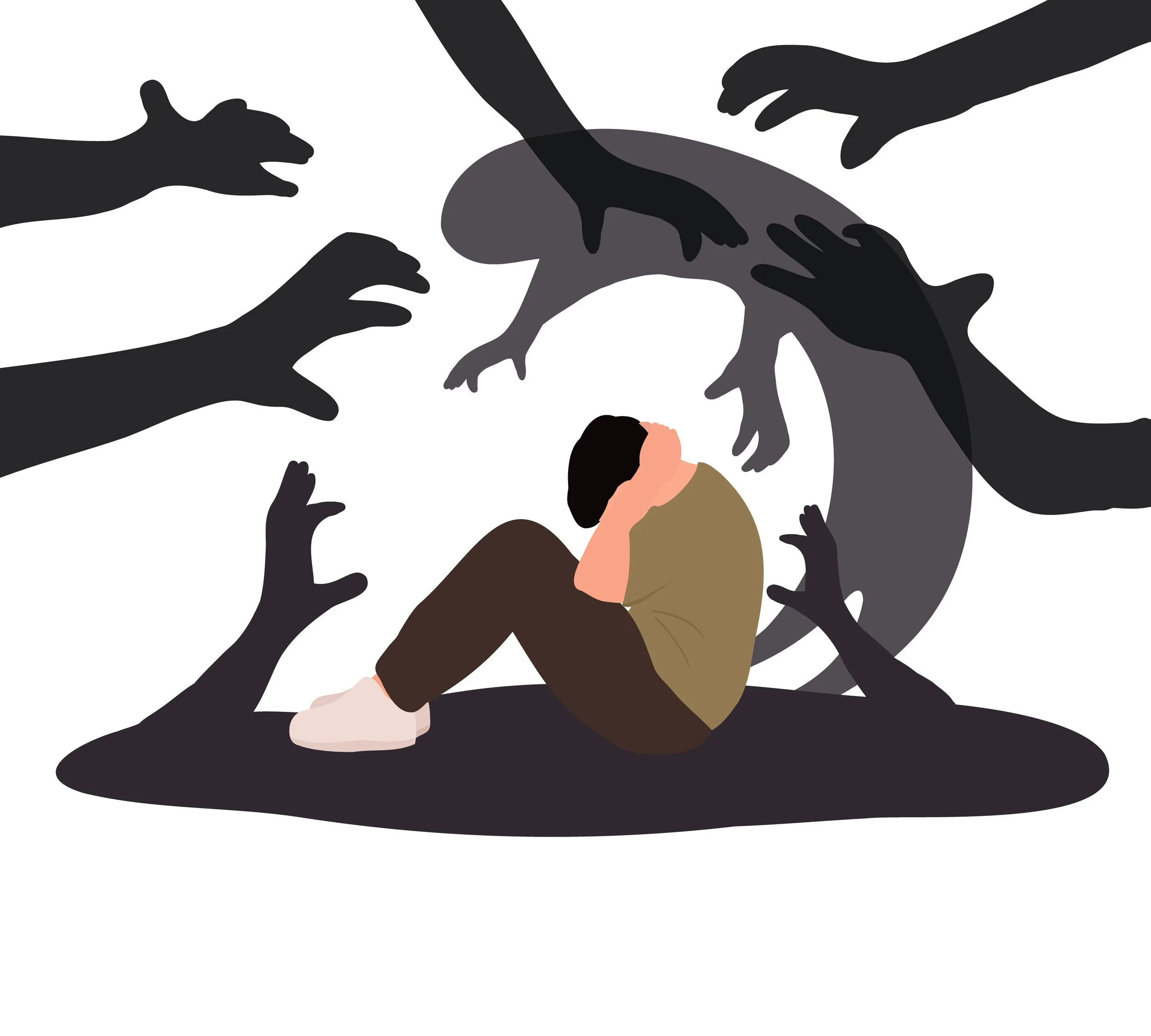Understanding Depression Triggers: Exploring Solutions
Depression is a multifaceted mental health condition affecting millions globally, yet its triggers remain diverse and highly individualised. While some people experience depression due to specific events, others may encounter it seemingly out of the blue. Understanding what triggers depression is essential for prevention and effective treatment.
This article delves into the common depression triggers, explores what causes depression, and offers insights into how depression can be triggered. We’ll also discuss specialised treatments at luxury rehab centres and recovery retreats, which provide holistic care for individuals grappling with depression.
How Can Depression Be Triggered?
Depression can be triggered by a wide range of factors, often categorised into biological, psychological, and social domains. For many, triggers involve a combination of these factors, amplifying their impact. Common triggers include:
Stressful Life Events: Significant changes, such as job loss, divorce, or the death of a loved one, are known triggers for depression. These events often challenge an individual's coping ability, leading to emotional overwhelm.
Trauma and PTSD: Individuals with post-traumatic stress disorder (PTSD) may experience depression triggered by events or stimuli that remind them of past trauma. This link underscores the question of what triggers post-traumatic stress disorder, as depression and PTSD often coexist.
Biological Factors: Hormonal imbalances, genetic predisposition, and neurochemical disruptions in the brain significantly contribute to depression. Chronic illnesses and medication side effects are also known to play a role.
Common Depression Triggers
Relationship Challenges
Conflict or separation in personal relationships is a leading cause of depression. Interpersonal loss can leave individuals feeling isolated and vulnerable, whether it’s a romantic breakup, estrangement from family, or the loss of a close friend.
Financial Stress
Sudden financial difficulties or ongoing struggles with money can lead to feelings of hopelessness and despair. Debt, unemployment, and economic instability are often cited as major depression triggers.
Chronic Illness
Illnesses like cancer, heart disease, or autoimmune conditions can cause physical and emotional exhaustion, contributing to depression. The diagnosis itself can be traumatic, triggering feelings of fear and helplessness.
Social Exclusion
Loneliness and rejection, whether in personal relationships or workplace dynamics, can exacerbate depression. Persistent feelings of not belonging can deeply affect self-esteem and mental well-being.
Substance Abuse
The chronic use of drugs or alcohol can alter brain chemistry, increasing susceptibility to depression. Substance abuse can also serve as a coping mechanism, creating a vicious cycle.
What Causes Depression?
Depression doesn’t have a single cause but is instead the result of multiple interplaying factors:
Biological Causes: Hormonal imbalances and genetic predispositions are major contributors. If a close family member has experienced depression, your risk may be higher.
Psychological Causes: Negative thought patterns, perfectionism, and low self-esteem can predispose individuals to depression, especially when combined with stress.
Environmental Causes: Unsafe living conditions, exposure to violence, or a lack of access to resources can significantly impact mental health.
What Triggers Post-Traumatic Stress Disorder?
PTSD often emerges after experiencing or witnessing a traumatic event. Common triggers include:
Flashbacks or Reminders: Seeing, hearing, or even smelling something that reminds an individual of their trauma can cause distress and trigger depressive episodes.
Anniversaries: Certain dates associated with traumatic events may evoke painful memories, leading to both PTSD symptoms and depression.
High-Stress Situations: Overwhelming circumstances can exacerbate PTSD symptoms, highlighting the interconnectedness of PTSD and depression.
Luxury rehab centres specialising in PTSD offer tailored therapies to address both conditions simultaneously, creating a safe space for recovery.
How to Manage Depression Triggers
Recognising and managing depression triggers is crucial for mental well-being. Here are steps to navigate potential triggers:
Identify Your Triggers
Keeping a journal to track mood changes and events can help pinpoint patterns or situations that trigger depression.
Build Resilience
Engaging in practices like mindfulness, meditation, and exercise can fortify mental strength and reduce the impact of triggers.
Seek Professional Help
When triggers become overwhelming, seeking support from therapists or checking into a luxury rehab centre can make a significant difference.
Develop a Support System
A strong network of friends and family can offer emotional support, helping you navigate challenging times.
Luxury Rehab for Depression: A Holistic Solution
For those seeking comprehensive care, luxury depression rehab centres offer an unparalleled environment for recovery. These facilities combine cutting-edge treatments with upscale amenities, including:
Personalised Therapy: Individual and group sessions tailored to address unique triggers.
Holistic Treatments: Activities like yoga, art therapy, and equine therapy to promote mental clarity.
Premium Amenities: Luxurious accommodations, gourmet meals, and spa services ensure comfort and relaxation.
Privacy and Confidentiality: This is essential for celebrities and high-profile individuals seeking discreet treatment.
Recovery retreats and premium rehab centres not only focus on treating depression but also emphasise long-term well-being, providing tools to prevent relapse.
Q&A
Q1: Can depression be triggered without an obvious reason?
Yes, depression can occur even without a clear or identifiable reason. While many people associate depression with specific life events or stressors, it’s important to understand that biological, genetic, and chemical imbalances in the brain can trigger depression independently. For instance, hormonal fluctuations, neurotransmitter irregularities, or inherited predispositions can cause depressive episodes even in the absence of external triggers. If you experience persistent symptoms of depression without an apparent cause, seeking help from a luxury rehab centre can provide personalised diagnostics and treatment.
Q2: Are certain individuals more prone to depression triggers?
Absolutely. Some individuals are more vulnerable to depression triggers due to various factors, including:
Family history of depression or other mental health disorders.
Personality traits, such as perfectionism or low self-esteem.
Past trauma or unresolved emotional issues.
Chronic stress or illness can weaken resilience over time. Understanding personal risk factors and receiving tailored therapy at a recovery retreat can help reduce susceptibility and build coping mechanisms.
Q3: What role do negative thought patterns play in triggering depression?
Negative thought patterns, also known as cognitive distortions, significantly contribute to depression. These include:
Catastrophising (assuming the worst possible outcome).
Black-and-white thinking (seeing situations as all good or all bad).
Overgeneralization (believing one bad experience reflects an ongoing trend).
Such patterns reinforce feelings of hopelessness and sadness, often acting as internal triggers. Cognitive-behavioural therapy (CBT) available at luxury rehab centres can help identify and modify these thought patterns, reducing their impact on mental health.
Q4: How can someone recognise if they’re experiencing depression triggered by trauma?
Depression triggered by trauma often overlaps with symptoms of post-traumatic stress disorder (PTSD). Key signs include:
Persistent sadness or irritability following a traumatic event.
Flashbacks, nightmares, or intrusive thoughts about the trauma.
Avoidance of places, people, or situations linked to the traumatic experience.
Feelings of guilt, shame, or worthlessness related to the event.
Difficulty sleeping or concentrating.
If these symptoms persist or intensify, professional intervention is critical. Luxury rehab centres specialising in trauma and depression provide a safe environment for healing through trauma-informed therapies and holistic care.
Q5: How do luxury rehab centres create effective treatment plans for depression triggers?
Luxury rehab centres tailor their treatment plans to the individual’s unique needs by:
Conducting comprehensive assessments to identify triggers and underlying causes.
Offering evidence-based therapies, such as cognitive-behavioural, dialectical behaviour, and trauma-focused therapy.
Incorporating holistic treatments like yoga, mindfulness, and equine therapy reduces stress and improves resilience.
Providing access to nutritionists and fitness experts to address physical health can influence mental well-being.
Crafting personalised aftercare plans to prevent relapse and maintain long-term emotional health.


